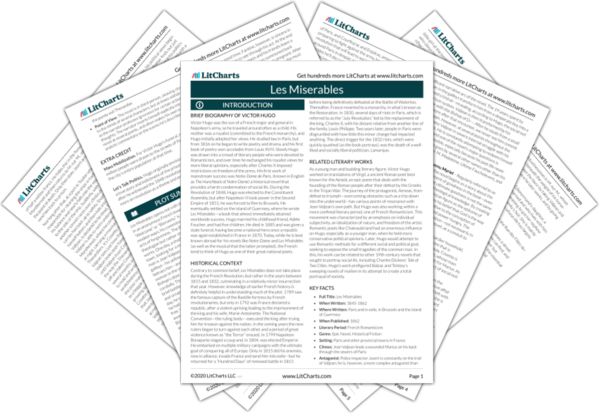Summary
Analysis
Chapter 1 The narrator begins by tracing the forms of “pigritia” or “sloth,” including “la pègre,” for theft, and “la pègrenne,” for hunger: thus they’re two sides of the same coin. Many object to this kind of slang, the language of prisons and convicts. The narrator thinks this is an even better reason to study and try to understand it. All professions have their own jargon. This includes ways of talking from the speech of printers to philosophers to duchesses, and even the puns of Shakespeare. But the kind of slang to which the narrator will limit himself is the one linked closely to wretchedness, a linguistic attack on social order.
The narrator suggests that hunger begets sloth and theft, so that those who are labeled “thieves” are often not as guilty as they appear. The narrator also positions this viewpoint as a moderate rather than radical one: slang such as this might not be beautiful, but it’s important to study it both because its practitioners are also members of humanity, and because it allows us to learn more about this particular social subset.
Themes
The historian must in any case study these social infirmities, just as he studies the people who toil and suffer, the interior pain and suffering of so many. A historian of people’s public life must be a historian of their deep inner life. The history of manners and ideas is another side of the history of events and facts.
We’ve already seen the connections made by Hugo between social and political history and individual narrative, but here he specifies that it’s specifically individual misery that has something to say about larger social issues.
Themes
Chapter 2 Every syllable of slang, the narrator argues, is darkened, but it’s still a language with its own poetry—a material deposit on which many languages and dialects have left a trace, as well as words simply made up by man. Slang is full of metaphor, like saying “to wriggle” for to eat, or “a rat” for a bread thief. As the dialect of corruption, slang can easily be corrupted itself and change its form and use.
By linking slang to poetry, the narrator proposes that it can be considered creative and even beautiful, as well as an opportunity to plumb meaning and complexity, since one word can have so many historical influences and contemporary examples of usage.
Themes
The songs of the galleys come from a cellar that once existed below the Chatelet, a vault with a stone ceiling and mud floor where men condemned to the galleys were kept before being transferred to Toulon. Chained to a beam running the length of the vault, men were sometimes kept months in the place, forced to remain motionless without lying down (or else they’d be strangled by their collar). Here slang songs had their birth. Slang thus recalls the desperate thoughts of the world’s most wretched inhabitants.
Here we learn about a particularly wretched example of Paris’s mysteries and secrets. The narrator is not exactly suggesting that we should celebrate slang, but by explaining that it arose out of the experience of the condemned, he shows how we can better understand social misery by studying the language of its victims.
Themes
Get the entire Les Miserables LitChart as a printable PDF.

Chapter 3 Though convicts’ songs of slang are often melancholy, over the course of the 18th century some also became jovial and insolent. This is a sign that convicts have lost a sense of their criminality. The narrator does not accuse the great Enlightenment philosophers like Diderot and Rousseau for this change, but rather those who stirred people up with appealing but illogical ideas and uncontrolled rage.
This chapter shows Hugo’s ambivalence—he doesn’t want to embrace people like Montparnasse, so he suggests that what distinguishes them is their shift from resorting to crime in desperation to participating in crime (and criminal songs) simply for the fun of it.
Themes
It was the French Revolution that cut short this dangerous line of thought, as it was like the idea itself armed with a sword, expelling unclean thought, stopping torture, and spreading the truth by equipping men with a sense of natural right. Now we no longer have feudal blood in our veins, and instead attempt to follow the law of liberty and progress. Still, the narrator somewhat regrets the “Jacquerie,” or wild anger, which is no longer able to scare those in power.
Hugo suggests that there was a place for anger and desperation, since it was visible and frightening to those in power at the time, but he also continues to profess a belief in slow, gradual progress as the best way to lead society out of its own crimes—crimes like condemning prisoners to inhuman treatment.
Themes
Chapter 4 Though society no longer has to fear sudden mass madness, misery hasn’t been eradicated: that can be just as dangerous. Progress means not just material improvement but also intellectual and moral growth. Those who refuse progress are merely condemning themselves. Instead, people must work for social harmony to prevent the kind of collapse that befell great civilizations of the past, such as Babylon, Rome, and Egypt. It is difficult to constantly seek the ideal when surrounded by menaces, but it must be done.
Here, we have a different idea of what makes society work or crumble—not uprisings by the masses, but rather the ability for people within society to emerge from misery and play their own part in progress. The narrator suggests that poverty and misery can have world-historical consequences, by tying this portrait to a notion of civilizational collapse.
Themes












